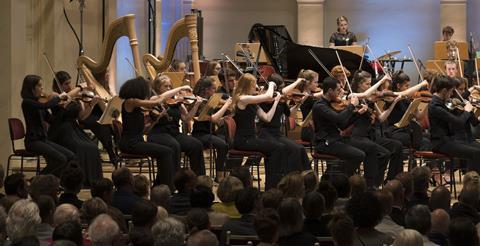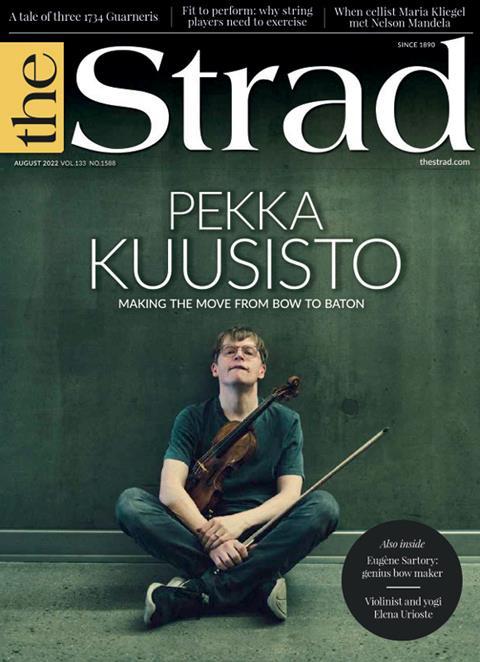Megan Clarke, a 16-year-old cellist in the National Youth Orchestra, is on a mission to communicate her love of classical music to other young people

Explore more Featured Stories like this in The Strad Playing Hub
The more I connect with audiences as a young musician, the more I recognise the need to redefine classical music. I am a 16-year-old cellist and member of the National Youth Orchestra of Great Britain, and the idea of breaking down the traditional barriers surrounding classical music is frequently at the forefront of my mind. As artists, we hold the power to show the world the beauty of music, and how playing together can truly change lives and perspectives.
I have often observed divisive attitudes towards classical music from my peers – classical music can be perceived as serious, polite and unrelatable to society at large. Our NYO concerts have free tickets for teenagers, so this presented me with the perfect opportunity to invite some friends to hear the orchestra in action. I was excited about them coming, but also unsure as to how they would react to such a diverse and avant-garde programme, including Stravinsky’s The Rite of Spring, Gabriela Ortiz’s Téenek and Dinuk Wijeratne’s Tabla Concerto. After the concert, my friends could not contain themselves – they loved some parts, they were confused about others and they also had a lot of questions. Their reaction excited me: it made me realise that there really is something for everyone in classical music. I feel so strongly about NYO’s mission because we are setting a precedent, and with that we are shaping people’s lives.
We really want our audiences to feel immersed in NYO’s community and spirit. Our preconcert performances in the foyer spaces on this year’s tour meant that the musical journey started from the moment the audience entered the venue. The palpable energy then travelled into the concert space – we also played while processing on to the stage, and it felt like the audience could tune into the performance in a way that felt less formal.
Read: NYO musicians invite performers for socially-distanced ‘Jupiter’ performance
Read: String ensemble skills are life skills – not to mention professional imperatives
Discover more Featured Stories like this in The Strad Playing Hub
Speaking directly to audiences is something I’d never experienced until last year, when I was one of the concert speakers in a sold-out Barbican Hall, London. We were communicating our own experiences of performing the repertoire and what it meant to us on a personal level. It was an incredible opportunity, and I felt it added to the context of the concert. If we want to make concerts more relatable, then why not hear directly from the musicians?
One thing that stood out for me when I joined NYO was the shared passion, joy and commitment of each member of the orchestra. The NYO Inspire programme opens up orchestral playing to even more young musicians, providing opportunities for those who may otherwise not be able to access high-quality orchestral music making. Orchestra members frequently visit schools around the country to perform with young people and present workshops. To me, it feels as if the students are inspiring us, just as we are inspiring them.
We hold the power to show the world the beauty of music
The reaction we received from an audience of schoolchildren we played to in Saffron Walden will stay with me for a long time: people were cheering and whooping, letting out the emotions we had provoked in them. We were reminded of why we do this: to make people feel alive through music. When is there a better time to show people how we want the future of classical music to be shaped?
The sheer complexity with which we can communicate through music astounds me with every performance. Our ability, as musicians, to provoke thought, trigger an emotional reaction or bring hope is unparalleled by any other experience. More than words, music can elicit profound emotions. It is a conduit through which many topical issues can be addressed and understood, precipitating change and forging new connections. NYO has taught me all of this and more. I am developing not only as a cellist but also as a person, and as an advocate for the position of classical music in society today.
Read: Opinion: Defining relevance
Read: Opinion: Dare to be different
Discover more Featured Stories like this in The Strad Playing Hub
-
This article was published in the August 2022 Pekka Kuusisto issue.
The adventurous Finnish violinist talks to Andrew Mellor about his predilection for finding new challenges – including a recent shift to the conductor’s podium. Explore all the articles in this issue
More from this issue…
- Pekka Kuusisto
- Three 1734 Guarneris
- Musicians and exercise
- Session Report
- Sartory bows
- Elena Urioste
Read more playing content here
-












































No comments yet